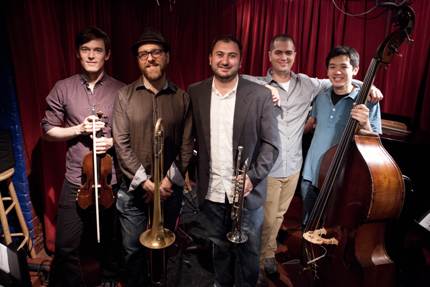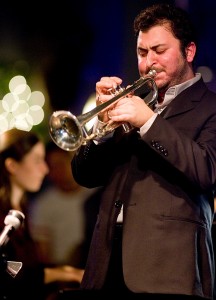Josh Deutsch loves jazz.
He can speak to it in excess, understands it and appreciates all the jazz greats.
Originally a pianist before switching to trumpet, jazz is Deutsch’s life — in every component.
Teaching, when coinciding with performing, is one of Deutsch’s favorite parts of music as he helps his students explore the technical and creative aspects of jazz. While telling his students they need to develop their ear, Deutsch says he himself will start to do the same when rehearsing. At the same time, watching students improvise and write their first pieces is personally rewarding.
But it isn’t necessarily Miles Davis’ skills as a trumpeter Deutsch says he tries to emulate. Rather, it’s Davis’ ability to arrange a select group of musicians with varying styles that all come together. An example he cites is “Miles Smiles,” Davis’ 1967 album, which featured pianist Herbie Hancock, saxophonist Wayne Shorter, drummer Tony Williams and bassist Ron Carter.
Davis’ desire to find the exact sound he wanted drove him to forming some of the most storied groups in music history.
“The way that he set up the group, the conception for a band – idea for the overall sound he wanted,” he said almost at a loss of words to describe Davis’ abilities.
He has in part brought this dynamic to one of his groups: Pannonia, which he describes as “a very New York band.”
The five-man ensemble is made up of violinist Zach Brock, trombonist Brian Drye, bassist Gary Wang and percussionist Ronen Itzik. Deutsch, when composing for the group, considers what each member’s style is and uses it as a base for each musician’s innovation.
“I’m not just bringing in a tune,” he said. “I’m bringing in music for individual musicians. I have both the instrumentation picked out, but then it’s almost like another level of innovations [by the musician].”
The Seattle-born trumpeter who grew up in a culture where jazz was surprisingly popular among middle and high school programs said he gravitated toward New York and Queens, by the wide range of musicians that have made the city their home.
“As far as putting projects together: the level of musicians here [have a] good variety,” he said.
Lately, he’s been focusing on more shows in Queens to expand jazz to a wider base of listeners. He helped establish the Queens Jazz Overground, which he says is a response to the Brooklyn Jazz Underground. The project is a collection of Queens-based Jazz ground, including Deutsch’s group Pannonia.
The Overground is intended bring in music listeners — mainly families — who might not travel to Brooklyn or Manhattan to take in some Jazz. The project’s goal is to “connect with people that may be music fans, but wouldn’t want to go to Brooklyn and Manhattan to go to a music club.”
“Since I’ve been here,” he said. “I don’t think people think about going to music in Queens.”
Deutsch is happy where his music is going, and aims on starting more projects with new sounds. Deutsch is currently working on several projects, and the smaller ones allow him to travel out of New York once and a while and get more exposure.
While New York has a slew of music lovers, and musicians, listeners outside of the five boroughs really take an ear to jazz and all music in general.
“Obviously, as musicians, I think we want to get the music out there to as wide of an audience as possible,” he said.“When you get out of New York and play your music in other places…people get really into it.”
RECOMMENDED STORIES
































